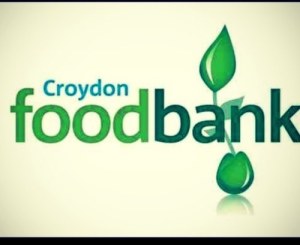
Unbelievable govt comment this week on Foodbanks
I often pick up on interesting exchanges from the Commons. However, this week I came across one which went way beyond ‘interesting’ and well into the territory of ‘he can’t possibly have really just said that’.
I’ve written before about Foodbanks and spent the last bank holiday working for the one in Croydon and the appalling gall of David Cameron in trying to claim the exponential rise in their numbers as an expression of his ‘Big Society’. Cameron has also been incredibly disingenuous when criticised about this rise, claiming that ‘The use of food banks went up tenfold under the last Labour government’
Here’s what made my jaw drop. It’s a passage from the Hansard record of Commons debates last Tuesday, 14th May 2013. During a debate on the cost of living, Labour MP Huw Irranca-Davies challenged the government on the exponential rise in the number of people relying on help from Foodbanks:
Against the glowing backdrop that the Secretary of State paints, why do I now have a food bank in every single village in my constituency when there was only one three years ago? Why has there been a quadrupling of food banks under this Government? His record cannot be that good, given the backdrop of the inexorable rise of food poverty.
As we’ve seen, Mr Irranca-Davies actually understated the situation. The latest figures were released at the end of April, so he should have said that Foodbank use has gone up almost nine-fold under this woeful government. Close to Cameron’s misleading claim of a tenfold increase under Labour, but 9 times a far larger number to begin with. Perhaps Mr Irranca-Davies didn’t have the latest numbers, but it’s a pity he missed the opportunity to confront the government with its even greater culpability.
Government minister Ed Davey gave his staggering response:
People who run food banks are doing an extremely good job and deserve credit for their work. However, it is completely wrong to suggest that there is a statistical link between the Government’s benefit reforms and the provision of food banks. It is good that people are helping others. I hope the hon. Gentleman supports that.
Not only does Davey repeat Cameron’s hubris by claiming the increase in Foodbank use as a social good – he claims that the rise has nothing to do with the government’s benefit ‘reforms’.
I have news for Mr Davey. The number of people coming to the Foodbank for help in Croydon i helped out on doubled overnight when the government’s latest ‘reforms’ kicked in at the beginning of April, including the cancellation of the ‘crisis loan’ programme.
There can no doubt whatever in the mind of any reasonable, honest person that the government’s persecution and impoverishment of those who are already poor and disadvantaged is directly responsible for the massive increase in the number of people in such desperate straits that their only option is to accept the humiliation of admitting to strangers that you literally have no food to put on the table for yourself or your family.
That ordinary people have galvanised themselves to save others from starvation is amazing, and heartwarming.
That our government is increasing the number of people who need saving by around 350 people per day for the whole of last year (a number that unquestionably continues to accelerate) should have the Tories and LibDems cowering in shame – and make them unelectable forever. Instead the government is claiming ‘It’s nothing to do with us, guv‘.
Anyone who would think for even a nanosecond of voting for either party in the next general election needs either their head or their heart examined – or both. #justsaying

Homelessness warning as London’s young find it impossible to rent a room – Published by Central Government
Homelessness warning as London’s young find it impossible to rent a room
People under the age of 35 and claiming benefits are finding it increasingly difficult to find an affordable room to rent in London, according to new research published today.
Homeless Link’s ‘Nowhere to Move’ report shows that only 5.5% of shared properties in the capital are affordable to under 35-year-olds claiming benefits while less than 1% of landlords said they were willing to accept this type of tenant.
Last year, the government made a change to the Shared Accommodation Rate (SAR) – the level of housing benefit that applies to single people in the private rented sector – that placed restrictions on claimants under the age of 35.
Launched today at Homeless Link’s national conference on housing, the report’s findings strongly suggest that welfare reform is adding to an already severe housing crisis in London.
The SAR is limited to a maximum amount based on what is seen as appropriate rent for a room in a shared property. Until January 2012, this only applied to 18-24 year olds but was extended to include all benefit claimants under 35. According to the government’s own figures this added a further 12,000 people to those already competing for shared accommodation.
Government sets housing allowance limits so that 30% of properties in an area are affordable to those who claim it. However, the report reveals that the actual figure in London is much lower – just 5.5%. The allowance hasn’t increased in-line with the significant rises in private rental prices, pushing more and more properties out of reach.
The report also suggests that the attitudes of private sector landlords could be putting benefit claimants at a severe disadvantage. From our sample of properties, less than 1% had landlords that explicitly stated they were happy to rent to benefit claimants.
These findings present a situation in which changes to the welfare system could be further limiting access to affordable accommodation for people under 35. The report suggests a number of recommendations in order to avoid potentially forcing people into homelessness. Primarily, housing benefit rates should be adjusted to reflect the real cost of renting shared accommodation in London and ensure that claimants have access to at least 30% of properties in their local area.
This report clearly shows that the recent changes to the system have left it falling far below the mark and could be putting many people at risk of homelessness.
The bottom line is that the housing crisis must be fixed and the dysfunctionality of the housing market needs to be addressed. In the short-term, government must make in-roads by ensuring that more properties are affordable and encouraging landlords to open their doors to those on benefits.
There is also evidence at Broadway of the negative effects of the housing benefit changes. People are losing their homes and those looking for accommodation from the streets are finding the move on from temporary accommodation increasingly difficult.
We can only see the situation getting worse unless urgent action is taken to make properties more affordable for those on benefits.
Homeless Link examined data taken from 55,537 property listings in London to assess the impact of this change.

Youth unemployment has increased by 340 per cent in the past two years, according to new figures released this week.
This means the number of young people aged 16-24 out of work and on Jobseekers’ Allowance remains close to the one million mark and almost 74,000 of those have been unemployed for more than a year.
Youth unemployment has dropped a little in the past few months, but only by 17,700 since December 2012. This figure is just too small to make any real dent and this remains a concern that youth unemployment now will have a lasting impact on the future.
Unless we support under-25s into work now, we risk storing up economic and social problems in the future, The government must urgently review whether apprenticeships and the youth contract are reaching those young people furthest from the labour market and should consider implementing pre-apprenticeship schemes to address any failings.
The vast majority of homeless young people want to work and the government must respond to their commitment and end this tragic trend of long-term youth unemployment.

£10m for homeless after hospital stays
HEALTH minister Anna Soubry has announced a £10 million boost for homeless people who are leaving hospital.
It is estimated that 70 per cent of homeless people are discharged from hospital without their health and housing problems being properly addressed.
The cash will support voluntary organisations to help them work with the NHS and local authorities to ensure homeless people receive the best possible support and care after leaving hospital.
The £10 million will also be spent on intermediate care after discharge – vital for recovering from health problems such as tuberculosis.
Ms Soubry, the MP for Broxtowe, said: “Homeless people are too often discharged back on to the street without their problems being properly addressed. This is damaging to their health and increases NHS costs through ‘revolving door’ admissions.”
In relation to this and a little digging on the Internet I found details that The Chartered Institute of Housing (CIH) has said housing can help health and wellbeing, but the sectors need to work together. The report shows how good housing can help people leave hospital more quickly and help care to be delivered more effectively.
The CIH have called for housing associations and landlords to work more closely with health and social care providers, to get the benefits from the partnership.
They have suggested a localised approach to this, and have suggested that housing organisations approach local GPs and new commissioning groups to offer local services, such as supported housing, housing-related support, housing improvements, adaptations and palliative home care.
This can improve people’s health and well-being as well as save money for health and social care providers.
The report is based on meetings held by the CIH earlier this year, delivering housing, health and care outcomes, where people expressed interest in promoting the application of assistive technology.

Cash boost to improve rent options for single homeless people
The Government announced at the Homeless charity Crisis conference on Monday 13th of may a £1m funding to help single homeless people find accommodation in privately rented properties. Crisis, will be given £800,000 to help set up new shared tenancies for single homeless people in privately rented accommodation. The rest of the funding will be used to work with landlords to help vulnerable people find homes in the private sector.
Communities minister, Don Foster, said:at the conference ‘No-one should have to face the frightening prospect of homelessness, and for many, particularly younger, single people, renting a room can be an affordable alternative to a flat or house.
‘We want to ensure that option is widely available, which is why today we’ve provided Crisis with a million-pound boost, helping hundreds more vulnerable people into tenancies that work for them, and finding a way forward to make rented rooms a reality right across the country.’
Eight schemes across the country will help landlords create more rooms for rent in shared accommodation. The project will also work with those facing the threat of homelessness.

Councils have received increased requested for emergency welfare following the introduction of the bedroom tax.
Also from the Crisis conference it was stated that 60% of the people of those it effected most was the disabled. There has been a sharp increase reported from councils across Britain for an emergency hardship fund to help cover the personal shortfall in money.
Discretionary Housing Payment (DHP) is intended to be paid out as an emergency when someone claiming housing benefit or council tax benefit is having difficulty paying the rest of the rent themselves.
Since the bedroom tax was introduced on 1st April last month, numerous councils in Britain a reporting a huge increase in the demand for the fund.
The government allocated initially £60 million but has had to increase this to £155 million to DHP, and the rise in demand for the fund is the first quantifiable sign that the bedroom tax is making it harder for tenants to meet living costs.
Leeds Council has received 1,256 applications compared with 226 last April.
Sefton Council received 321 applications since 1 April, which is 9x their normal amount.
Southampton Council had 295 applications compared with 75 in April 2012.
Birmingham Council received 2,000 applications in the first two weeks of April, which is 50% more than the figure for the whole of the first quarter of the 2012/13 financial year.
Glasgow Council has received 5,501 applications for April, compared to 1,437 for the same period last year.
Liverpool Council received 1,265 applications in April when it receives an average of 138 a month.
Sheffield Council received around 1,400, compared to an average of just 100 per month throughout the 2012/13 financial year.
Hull, Leicester and Southwark councils all received at least five times as many applications as they would normally receive in a month. Waltham Forest Council’s received 226 applications when their average monthly amount is 72.A total of 12 other local authorities also reported increases.
Spelthorne, Oxford, Harlow, Amber Valley, Suffolk Coastal, Maldon, Wycombe, Welwyn and Hatfield, Telford and Wrekin, Craven, Eastbourne and Derbyshire Dales councils have reported combined DHP applications of 1,070 in April this year, compared to 252 in the same period last year.
This is having a knock on effect on the councils, many expecting a shortfall themselves to cover the necessary funds that are given out to struggling claimants.
DHPs are intended as short term solution, and the government have provided funding as a temporary solution, so what will happen if these short term problems continue to happen every month now that the cut has been introduced?

We want these young people off the streets and into a home and a job. Please help bring awareness to this growing problem and sign the petition. Thank you. http://www.eyh.org.uk/news.html
So have you ever wanted to know what happens to your toiletries when confiscated at the airport well a business man from Slough did and decided he could put them to a use
Slough homeless given hundreds of abandoned airport toiletries
Continue reading the main story
Hundreds of toiletries left by passengers at an airport have been donated to homeless people in Slough. Up to 200 items left at Heathrow Airport security check-ins have been given to ‘Slough Homeless Our Concern’
The charity collects donations every two weeks which are then handed out to its clients at Serena Hall.
Airport restrictions mean liquids are only allowed in hand luggage in containers holding 100ml or less so many items are left at security gates.
Georgie Takhar, director of Maidenhead recruitment firm Muse Resourcing, set up the project after coming up with the idea while queuing at the airport.
Homes brought back to life thanks to Norwich’s homeless.
A project that sees homeless people learning construction skills as they refurbish empty homes and bring them back into use has completed its first flat,
The Make A House A Home scheme is run by St Martin’s Housing Trust in partnership with Norwich City Council, Norwich Leap, Building Futures in Norwich, and CTS (Construction Training Specialists).
It is aiming to bring 10 homes which have been empty for at least six months back into use by April 2015.
Work on the homes is carried out by homeless city people, supported by St Martin’s Housing Trust and Norwich Leap, who are keen to develop new skills, move forward with their lives, and gain a recognised qualification.
Yesterday, the keys for the first refurbished flat were handed over by CTS to St Martin’s Housing Trust, who will now find someone in need of a home to take on the tenancy.
Each construction trainee who has worked on a property will get the chance to bid for it and become the tenant.
The construction trainees complete a six-week training course where they are taught a range of skills including brickwork, carpentry, joinery, painting, plastering, plumbing and wall-papering, as well as gaining an understanding of health and safety issues.
At the end of that course, they head into the property for some real hands-on experience.
One of the success stories is Shaun Newton who hopes the skills he picked up during the eight-week refurbishment will lead to a job.and yesterday, he joined the project’s partners at CTS’ base at White Lodge Business Park in Norwich to collect a certificate acknowledging his hard work and the entry-level qualification he has gained.
Together with five other homeless people, he has helped to get the first flat in Mile Cross ready for a new tenant. Mr Newton who is the same age as me at 42, had been living in a hostel when he first got involved with the project. By the age of 28, both his parents had died and he was struggling to cope. He fell behind on rent payments and became homeless. This scheme has helped Sean (Below with his certificate) and he’s been able to move forward, gain confidence and belief in himself that he can get a job in the future. I wish you luck on the project and in the future.

Travellers jailed for treating homeless men as slaves
The head of an Irish Traveller family and his son were jailed for a total of 13 years yesterday on the 7th May for keeping homeless and vulnerable men captive and treating them like slaves.
Tommy Connors Senior, 53, known as ‘Lyncham’, and his son Patrick Connors, 21, were sentenced to eight and five years respectively.
A jury heard how the family recruited homeless out of work men, often alcoholics, from soup kitchens and off the street with a promise of paid work, food and lodgings.
Judge Michael Kay, passing sentence on the father, said this was a ‘monstrous and callous deceit’ because they were forced to work with no wages and kept against their will in squalid accommodation.
One worker told the police: ‘It was like being an animal in a cage. The animal tended to fly about, then automatically go back to the cage because it was used to it.
‘There was always something, “Clean the cars, clean the yard”. There was never a good day. The travellers used to say: “No pain no gain”.’
Judge Kay said the Connors had recruited hundreds of vulnerable workers over the years who had been subjected to intimidation and threats of violence.
They were forced to live in accommodation such as horseboxes or cold caravans and sheds on a Bedfordshire Travellers’ site and driven to a service station or leisure centre once a week for a shower.
Their heads were shaven and they were given a basic diet such as of biscuits, Pot Noodles or beans and eggs.
Workers were forced to do back-breaking work including paving and laying tarmac and gravel but were not paid while the Connors made thousands of pounds.
The police found £16,000 of cash in the father’s luxury static home on the site and evidence that he had £130,000 in bank deposits.
After the month-long trial yesterday, the jury failed to reach verdicts on two other sons, Tommy Junior, 27 and James, 25 and the prosecution formally offered no evidence against them.
The father and son were sentenced yesterday for crimes they were found guilty of last July of conspiring to hold a person in servitude and conspiring to require a person to perform forced or compulsory labour.
The charges involved two different workers and they were also convicted at the time of assaulting them occasioning them actual bodily harm. The retrial was held as the jury failed to agree on further charges in July last year.
All four members of the Connors family in the latest trial pleaded not guilty to three charges of conspiracy to hold a person in servitude and three of conspiracy to require a person to perform forced labour. The jury retired to consider the verdicts last week, but yesterday announced they were unable to reach verdicts on any of the charges against the four meaning the father and son could be sentenced for the crimes they were found guilty of in the summer last year.
At the end of the first trial last year, the daughter of Tommy Connors Senior and her husband were jailed after being convicted by a jury of keeping vulnerable men in servitude and requiring them to perform forced labour.
Travellers James John Connors, 34, and Josie Connors, 31, were convicted of two counts each of keeping people in servitude at the Greenacres site and jailed for 11 years and four years respectively.
James John Connors, known as ‘Big Jim’ was also convicted of assault occasioning actual bodily harm.
Bedfordshire Police mounted a raid on the Greenacres Travellers site near Leighton Buzzard in September 2011 to free 13 ‘workers’ being held against their will by Tommy Connors snr and other family members.

A coat developed by a social entrepreneur and designed for homeless people is now a somewhat hot item in the high-end fashion world.
Earlier this month, 23-year-old Veronika Scott said that she had plans to add a for-profit arm to her non-profit company, The Empowerment Plan, which has donated over 1,000 coats to the homeless since launching in late 2010.
Scott’s foray into the private market comes after she debuted the coats at last year’s Aspen Fashion Week to much fanfare, helping her land a $100,000 investment from the billionaire founder of Spanx, Sara Blakely.
Designed for the homeless in her hometown of Detroit, where winter temperatures regularly fall below freezing, the coat doubles as a sleeping bag. And therein lies its instinctive appeal.
“At the end of the day, people gravitate to the coats because it’s easy to understand,” Scott told Crain’s Detroit Business, referring to the apparel’s ability to adapt from clothing to bedding. “But the uniqueness is in what we do and who we hire.”
The Empowerment Plan employs formerly homeless women and trains them to produce the coats. There are now 10 women on staff who were all able to acquire housing after receiving a job and sewing training from the company.
Empowerment aims to make more than 4,000 coats this year, according to PBS. Inspired by the Tom’s Shoes “one-for-one” model, the company plans to donate a free coat to one homeless person with every purchase, Scott told Sustainable Industries.
Known as the “Crazy Coat Lady,” Scott is one of a number of young entrepreneurs in the Detroit area building businesses that seek to solve the city’s social problems, such as its high unemployment, poor access to housing and deficient public transportation.












